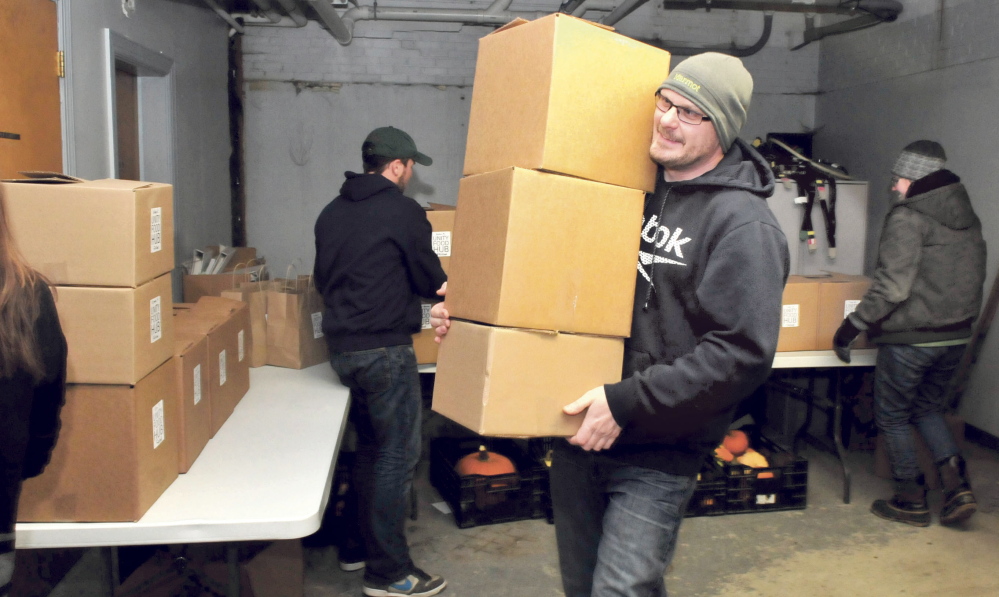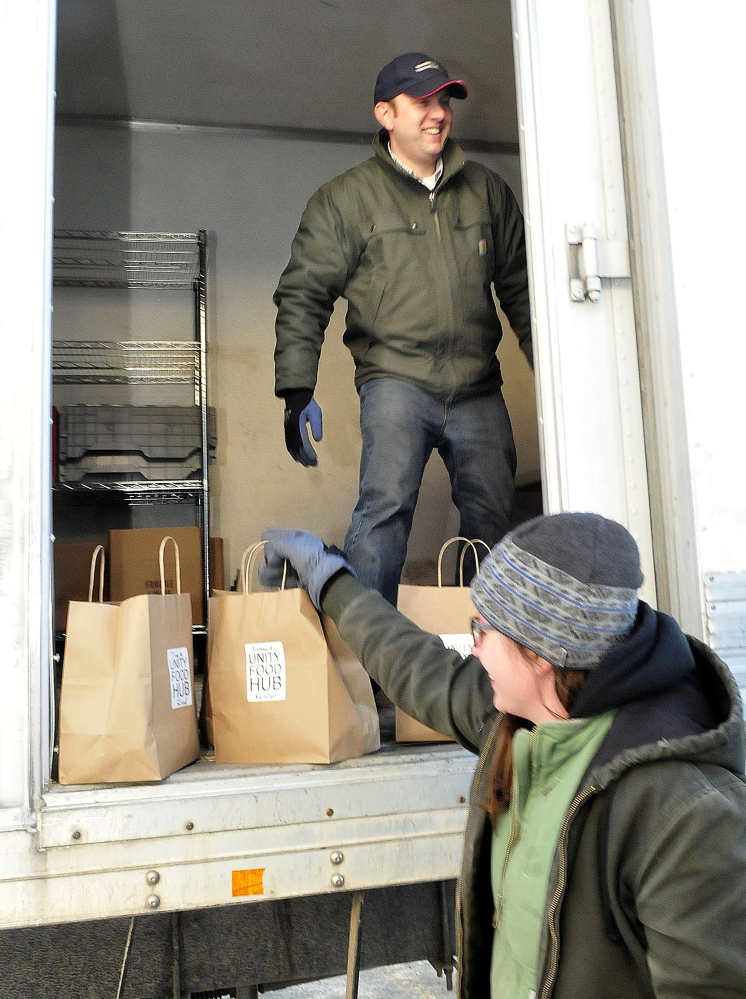On a freezing cold day at the call center for Johnny’s Seeds in Fairfield, Matt Tremblay and Colleen Hanlon-Smith unloaded boxes of vegetables, meat and dairy from local farms.
The boxes, neatly packaged and marked “Unity Food Hub,” will be picked up by employees participating in a new workplace community supported agriculture program.
“It’s like Christmas in here. Everybody is so excited,” said Sandy Turner, human resources manager for Johnny’s, as she carefully unpacked her box of veggies — including locally grown carola potatoes, sunchokes, leaks and futza squash — and transfered them to a reusable grocery bag in the basement of the call center.
The new workplace CSA offers farmers the chance to sell products on a wholesale scale to the food hub, which in turn sells shares of the produce and delivers them. Now, the program is only in place at Johnny’s and Maine Farmland Trust, although the food hub hopes to expand. Participants sign up for their shares in advance, so they don’t always know what they’ll be receiving, though they are guaranteed a certain amount of fresh locally grown food.
It’s also one way that the new Unity Food Hub, which had a soft opening in November and will open officially in the spring, is aiming to address the challenges that face local agriculture and expand the availability of local food. Located inside the former Unity Grammar School, which dates to 1898 and is undergoing renovations, the food hub was started by nonprofit Maine Farmland Trust, an organization whose aim is to preserve and protect farmland, but the plan is for it to eventually stand on its own as a for-profit entity.
“There’s so many policies and regulations to be mindful of (in the food industry) and food hubs are a creative approach to trying to navigate those logistics in a way that works for all the partners,” said Mike Gold, program manager for farm viability at Maine Farmland Trust. “The food hub concept is fairly experimental and new, and we recognize that. Having said that, we’ve really put a lot of time and resources into making sure we came up with a model that ensured the best success. A couple years from now what I’d really like to see is the food hub meeting a lot of needs of the local community as well as regionally.”
The goals of the food hub are to partner with local farms to help gather, distribute and market food by assisting farmers in placing more of their products with consumers and giving consumers more access to local food. The workplace CSA is a pilot program that distributes about 50 shares of produce, dairy and meat to workers at Johnny’s Seeds, as well as to employees at Maine Farmland Trust. The food comes from about 25 local farms within a roughly 45-mile radius.
The hub has also expanded on work started by the Maine Farmland Trust, including the organization’s community farm shares for low-income seniors and EBT recipients. The farm share, which is available twice a month in Unity, provides a farmer’s market type atmosphere with produce available for half-price for those who qualify.
“There’s nothing really new about the idea of a food hub, but what makes the concept unique is that it’s sort of predicated upon this idea of serving the farmer,” said Gold, who is also the owner of Alive ‘n’ Pickin’ Farm in Unity. He said the idea for the food hub came about around five years ago as a way to address challenges within the farming community. Several grants, including two from the U.S. Department of Agriculture and a grant from the Environmental Funder’s Network, have helped fund the renovations at the former grammar school and get programming started.
“As we develop more of a market to sell to, it will also be an incentive to grow more if that’s something farmers are interested in,” said Tremblay, who is the new manager of the Unity Food Hub. “There are a lot of young farms popping up with a lot of energy and activity.”
Gold said he hopes the food hub can help farmers distribute on a wholesale level not just in Maine, but also in markets as far away as Boston and New York, while at the same time expanding distribution locally, like through the workplace CSA, which the food hub hopes will expand to other businesses.
“It’s a good fit for our business. We sell to farmers and we want to support what they do,” Turner said. “We also want our employees to be healthy and so it’s part of a wellness initiative.”
Employees can have the cost of their CSA share deducted directly from their paycheck at Johnny’s, and the company also offered stipends as a reimbursement for employees who signed up this year. The deliveries come right to their workplace at three Johnny’s locations.
“It’s really easy. It’s delivered right here and there’s a lot of variety,” said Brigid Van Vlack, a human resources employee from Winthrop. “There are a lot of things you wouldn’t typically get at the grocery store, so it gets you to try different foods.”
Rachel Ohm — 612-2368
Twitter: @rachel_ohm
Send questions/comments to the editors.








Success. Please wait for the page to reload. If the page does not reload within 5 seconds, please refresh the page.
Enter your email and password to access comments.
Hi, to comment on stories you must . This profile is in addition to your subscription and website login.
Already have a commenting profile? .
Invalid username/password.
Please check your email to confirm and complete your registration.
Only subscribers are eligible to post comments. Please subscribe or login first for digital access. Here’s why.
Use the form below to reset your password. When you've submitted your account email, we will send an email with a reset code.